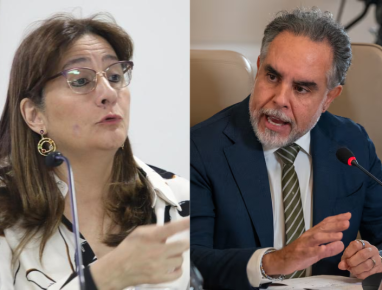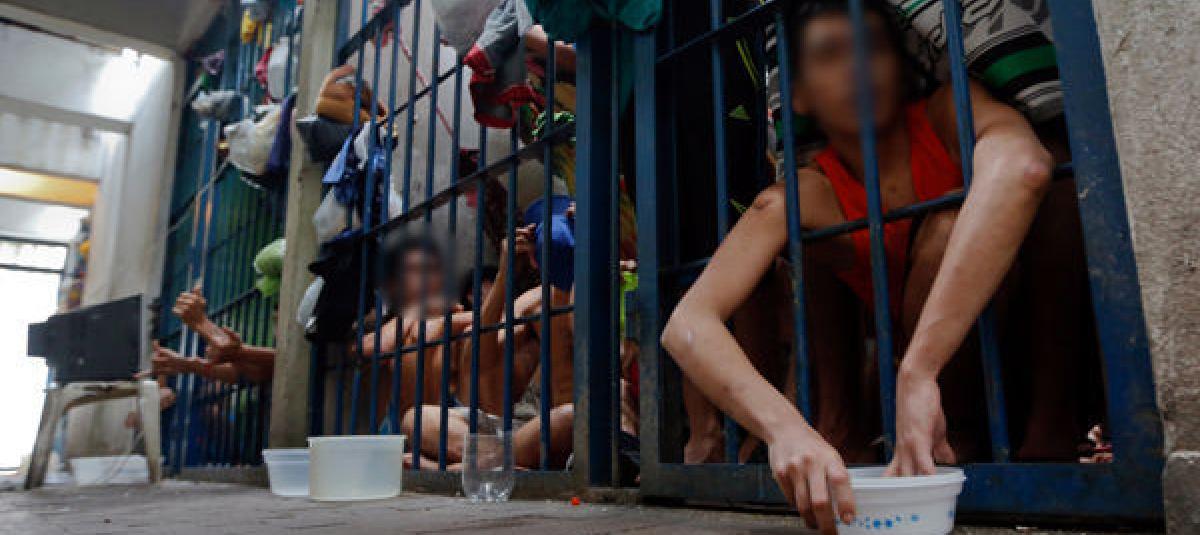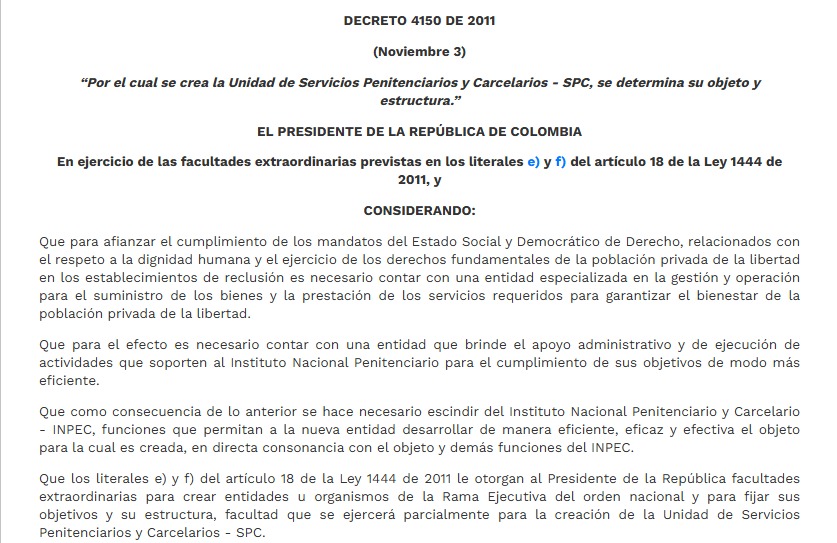USPEC: the powerful entity that, with a budget of almost $2 billion, became a stronghold of bureaucratic quotas

On April 30, Fidel Espitia, acting director of the Penitentiary and Prison Services Unit , the place where Interior Minister Armando Benedetti is said to be moving his pieces, officially awarded the most important contract of this entity, which represents almost half of its entire budget: food for all the country's prisons.
This multi-million-dollar process has been, since last year, one of the "obsessions" of the former director of that powerful entity, Ludwig Valero, who had already stated that he would seek, through public bidding, to improve a process that has long been criticized for corruption and poor quality.
However, on March 12, as the important bidding process was underway, Valero was asked to resign. While the official reasons were not disclosed, various sources attribute his departure to the fact that he was a "guest" of Liberal Senator Miguel Ángel Pinto, who led the proposal that ultimately defeated the Labor Reform proposed by President Gustavo Petro's administration.
What happened to the Uspec? 
The Ministry of Justice's departure came amid allegations of pressure from Armando Benedetti. Photo: Archive
The Penitentiary and Prison Services Unit, responsible for the food, health, and infrastructure of the country's penitentiary centers, has always been criticized as a haven for bureaucratic positions and quotas. In fact, as reported by this outlet, several current high-ranking officials are believed to be pawns, not only of Pinto, but also of Senator Fabio Amín, also of the Liberal Party.
However, the allegations made this week by former minister Angela María Buitrago regarding undue pressure and interference to appoint or remove officials appear to show that Minister Benedett's office is very interested in controlling an entity that will have a budget of nearly two billion pesos this year.
According to Buitrago, both Benedetti and Angie Rodríguez, current director of the Administrative Department of the Presidency (Dapre), directly pressured her to remove Valero "immediately."
But that's not all. According to statements made in an interview with EL TIEMPO, both officials allegedly pressured Buitrago to influence issues within the prison system "regarding the movement of inmates and certain relationships in particular."
But Valero's departure wasn't the only one. Currently, two of the most important positions in the organization are held by appointed individuals. A few days after the food bidding process ended, between May 9 and 12, the resignations of two key figures in the organization were accepted: the administrative and financial director, Juan Carlos Barragán, and the head of the legal department, Sergio Andrés Agón.
According to Buitrago, Benedetti pressured her to remove Valero "immediately."
In their place, according to the resolutions issued by the Uspec, Naslly Esperanza Fonseca was appointed to the Administrative Department, and Fabián Alberto Beltrán to head the Legal Department. As of the closing of this report, the names or resumes of those who would be permanently appointed have not been published.
Million-dollar contracts and a juicy budget Although it's not one of the highest in the state, the Uspec budget is no small matter. The food contract alone generates 946 billion pesos, equivalent to 49 percent of the total money allocated to that unit in the 2025 General National Budget: 1.9 trillion pesos.
To date, of that total, taking into account that the food tender has been signed less than 20 days ago, the Uspec has already spent 16 percent, the vast majority of which is operating expenses.
According to figures from the Ministry of Finance's Economic Transparency Portal (PTE), the Unit has 40 billion pesos allocated to salaries for a staff of 508 public employees in payroll expenses alone this year.
The entity's 2025 Pension Plan, obtained by EL TIEMPO's Data Unit, indicates that the Uspec payroll is distributed among 12 management-level employees, four advisors, 116 professionals, 70 technicians, and 99 support-level employees. All of this, considering only the base salary and not including bonuses and other salary benefits, represents resources totaling 183 million pesos per month.
The Unit has 40 billion pesos available for this year in payroll expenses alone.

Prison food violates the "right to food," says the Ombudsman's Office. Photo: ELTIEMPO
But the juiciest side of the USPEC lies in the contracts. Open figures from the Transparency Secretariat's Anti-Corruption Portal show that in 2023 alone , agreements worth 1.6 trillion pesos were signed, while for 2024, resources totaling 450 billion pesos were recorded.
This year, the most expensive contract so far is the one that, according to Secop II, aims to "provide food service for the incarcerated population, managed by the National Penitentiary and Prison Institute (Inpec) and the Penitentiary and Prison Services Unit (Uspec), which consists of breakfast, lunch, dinner, and a snack." (See the contract here)
This bidding process has always been highly contested. Organizations and NGOs such as the International Anti-Corruption Corporation (Coraci) have pointed out that in prison food procurement processes, there is often "concentration of contracting among the same market operators, the same groups, or specific prisons run by companies that have consistently bid and executed these groups without clear competition in this process and in previous events."
It is striking that, for 2025, several of the same contractors that were already there in 2024 appear, including the Macsol Temporary Union and Ardiko A & S Suministros.
But that's not all. The Ombudsman's Office has repeatedly called for improvements to a service it has described as "inhumane." On average, 16,626 pesos—much less than the cost of a typical Bogotá lunch—covers breakfast, lunch, dinner, and a snack for one inmate.
According to the Ombudsman's Office , there is "a flagrant violation of the fundamental right to food of the incarcerated population" because "food safety is not guaranteed due to a lack of maintenance of the ranch's infrastructure, a lack of kitchen utensils, and inadequate or insufficient facilities for food preservation, refrigeration, preparation, and distribution."
It remains to be seen whether this new contract, which is only just beginning to be implemented, will improve the conditions of this service in any way.
An entity with a budget 'at its fingertips' The entity, attached to the Ministry of Justice and Law, was created by Decree 4150 of 2011, with the objective of managing and operating the supply of goods and services, infrastructure, and providing the logistical and administrative support required for the proper functioning of the penitentiary and prison services under the responsibility of INPEC, according to the document.
By the year the USPEC was created, the country's prison sector presented acts of corruption that led to investigations by oversight bodies. Within this panorama, there is the 22-year sentence given to Luis Enrique Murallas Gutiérrez, a lieutenant of the INPEC, who led a network with other guards to demand million-dollar payments from inmates to enter the program of sentence reduction for study and work, according to the ruling of the USPEC.
Second Criminal Court of the Bello Circuit, Antioquia in 2011.

Decree creating the Uspec Photo: ELTIEMPO
Iván Unigarro Dorado, a lawyer specializing in public administration with a master's degree in public law, explained to EL TIEMPO the outlook for state actions and the potential consequences of the recent media storm surrounding the Uspec, as well as the contractual issue.
"The attention given to the entity is cyclical. It happens every two or three years. This is nothing new. This is based on the reason for the existence of the Uspec, the reason for its creation, and its purpose," says Unirrago. The Administrative Unit was created to completely divide the work of the INPEC during the administration of Juan Manuel Santos, under the direction of managing penitentiary and prison facilities in terms of property, the expert adds.
The goods categorize food, mattresses, and clothing, among other items necessary for the operation of prisons. The measure sought to centralize purchasing management to be more efficient, Unigarro adds.
"The entities that handle the most money are the executing agencies. An entity that handles billions of pesos, like the USPEC, is interesting because its resources are liquid," comments the expert, who differentiates the USPEC from other administrative units that lack this budgetary liquidity. This explains the impossibility of not transferring money to the USPEC, since in that case the prisons would cease to operate. Liquidity in the budget refers to money on hand, cash.
However, the expert warns about the complexity of providing food services, which is a reason for the administrative unit's higher budget expenditure due to the heterogeneous conditions of the different prison facilities.
The case, which has even become a source of controversy between the former Minister of Justice and Armando Benedetti, the current Minister of the Interior, raises several issues regarding government transparency. "In terms of legal consequences, criminal and disciplinary charges may be filed mutually for alleged conduct involving influence peddling, abuse of power, among other circumstances, and, on the other hand, libel may be committed."
"From a perspective in terms of public ethics and the fight against corruption, it is clear that the reasons, or what is brought to light, do not lie in alleged acts of corruption, but rather in the disagreements that may arise due to different political positions; all of this until the corresponding evidence and complaints are known," Unigarro states.
DATA UNIT TIME
eltiempo





